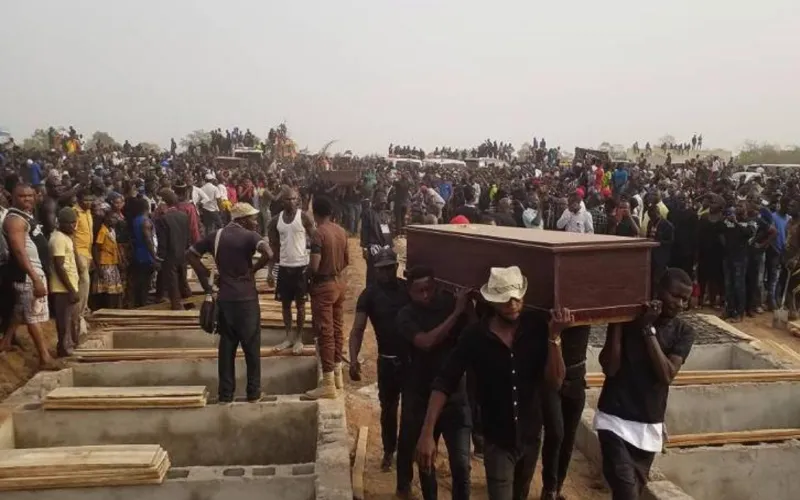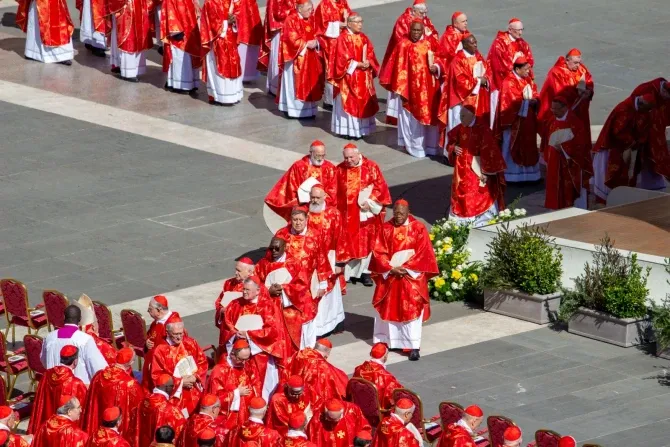Farmers who have been chased out of their homes are resorting to desperate means to survive, including prostitution, slave labor, forced marriages, street begging and human trafficking.
Additionally, there is a rise in post-traumatic stress disorders among survivors of the armed conflict, which Bishop Anagbe says is leading to increased aggression, intolerance and homicidal ideations among displaced populations.
Commenting on the origin of the armed Fulani herdsmen, the Local Ordinary of Makurdi said, “It is widely believed that some of these attackers are from the neighboring countries of Niger, Senegal, Guinea, Chad and Libya. They kill, plunder and occupy territories.”
ACN’s Director of Advocacy and Public Affairs, Mr. Mark von Riedemann noted that Muslims are in the majority in most of the Northern States, which have adopted Islamic Sharia law.
The ACN official Kaduna and Niger also operate under Sharia although the two States are often described as 50 percent Christian and 50 percent Muslim.
(Story continues below)
Most Central States are also a mix of Christian and Muslim, while the Southern States are mainly Christian and animist, Mr. Riedemann elaborated in the ACN conference.
The Director of Advocacy and Public Affairs at the Pontifical foundation observed that violence in Nigeria is intensifying in “a multifaceted crisis of security.”
“The country is locked in a perilous downward spiral,” Mr. Riedemann said, and added, “Areas of concern include the Islamist terrorist activity of Boko Haram in the Northeast; a long-running militancy and piracy in the Niger Delta; increasing violence of Fulani Islamist herders attacking Christian farming communities in the Middle-Belt and Southward, the separatist Biafra movement in the Igbo Southeast, and a widespread banditry throughout the country.”
He expressed regret that the government’s military response, including the use of self-defense groups, often entails abuses fueling local, community-based violence.
The ACN official links the various conflicts in Nigeria to banditry and piracy that take advantage of what he refers to as the weakness of a highly corrupt State and a general lack of security, as well as the widespread poverty affecting the majority of the population.
“Terrorism, be it Boko Haram or Fulani Islamists, can be broadly said to be driven by the poor social, cultural and educational condition of the Nigerian population, as well as by political mismanagement and corruption,” he said.
According to the official of the Catholic charity foundation, most of the terrorist groups operate in states with a predominantly Muslim population.
He says that local armed groups with local political and economic interests and ambitions are often infiltrated by international terrorism groups such as Al-Qaeda or ISIS, and, incited by Salafist preachers, seek to impose the strictest version of Sharia law on all the inhabitants of the state through violence, he says, and asserts, “In many cases, Muslims and Christians are equally victims of this violence.”
In the instance of the pastoralist Fulani, who have suffered a reduction in grazing for their cattle in the North of the country for climatic reasons and seek territorial alternatives, Mr. Riedemann says, many of them have been seduced by the jihadist message as a further incentive to expand their areas of control.
“These militant herders have invaded the lands of predominantly Christian farmers, murdering, raping and injuring, and ravaging villages and towns, and in so doing provoking a mass departure of Christians who see their lives and farms in danger,” the ACN official says.
The Director of the Catholic peace foundation Denis Hurley Peace Institute (DHPI), Johan Viljoen, provided an update on the insurgency in South East Nigeria and also presented the organization’s recently launched report on Nigeria’s Anambra State.
“The situation in Anambra is critical,” Mr. Viljoen said, and added, “There is widespread destruction of houses and farms. No crops are being grown.”
“The way the crisis presents itself differs from Benue State, in as far as there are no camps or settlements for IDP’s – they have taken shelter with friends or relatives in safer areas, or are wandering the streets as homeless people,” the DHPI official said.
Bishop Anagbe said that though Catholic Dioceses in Benue State have shown concern towards the plight of the IDPs by working tirelessly in carrying out interventions to alleviate the suffering of the displaced people, the increasing number of IDPs in the State occasioned by renewed attacks has become alarming.
The Nigerian Bishop has called on the international community to exert influence on the Federal government of Nigeria to reclaim ungoverned spaces and territories seized by armed herders in the country, most especially in the Benue Valley which, according to the Bishop, has become “a major theatre of war.”
The Bishop has also appealed for mobilization of substantive support for coping and resilience building amongst affected populations especially in the restoration of livelihoods.
Local and international media are not giving the reality of the insecurity in Nigeria, Bishop Anagbe said. He appealed to the media to provide balanced and uncensored content on the true situation of affected populations and communities.
Such reporting, the Catholic Bishop said, will neutralize “distorted and erroneous perspectives that are sometimes injected into the media space to exacerbate tensions or to shield impunity.”
Bishop Anagbe also appealed to the international community and well-wishers in the West African country to support centers that are sheltering internally displaced people who lack food, medication, access to education as well as psychosocial support.
Agnes Aineah is a Kenyan journalist with a background in digital and newspaper reporting. She holds a Master of Arts in Digital Journalism from the Aga Khan University, Graduate School of Media and Communications and a Bachelor's Degree in Linguistics, Media and Communications from Kenya's Moi University. Agnes currently serves as a journalist for ACI Africa.








